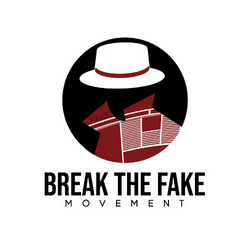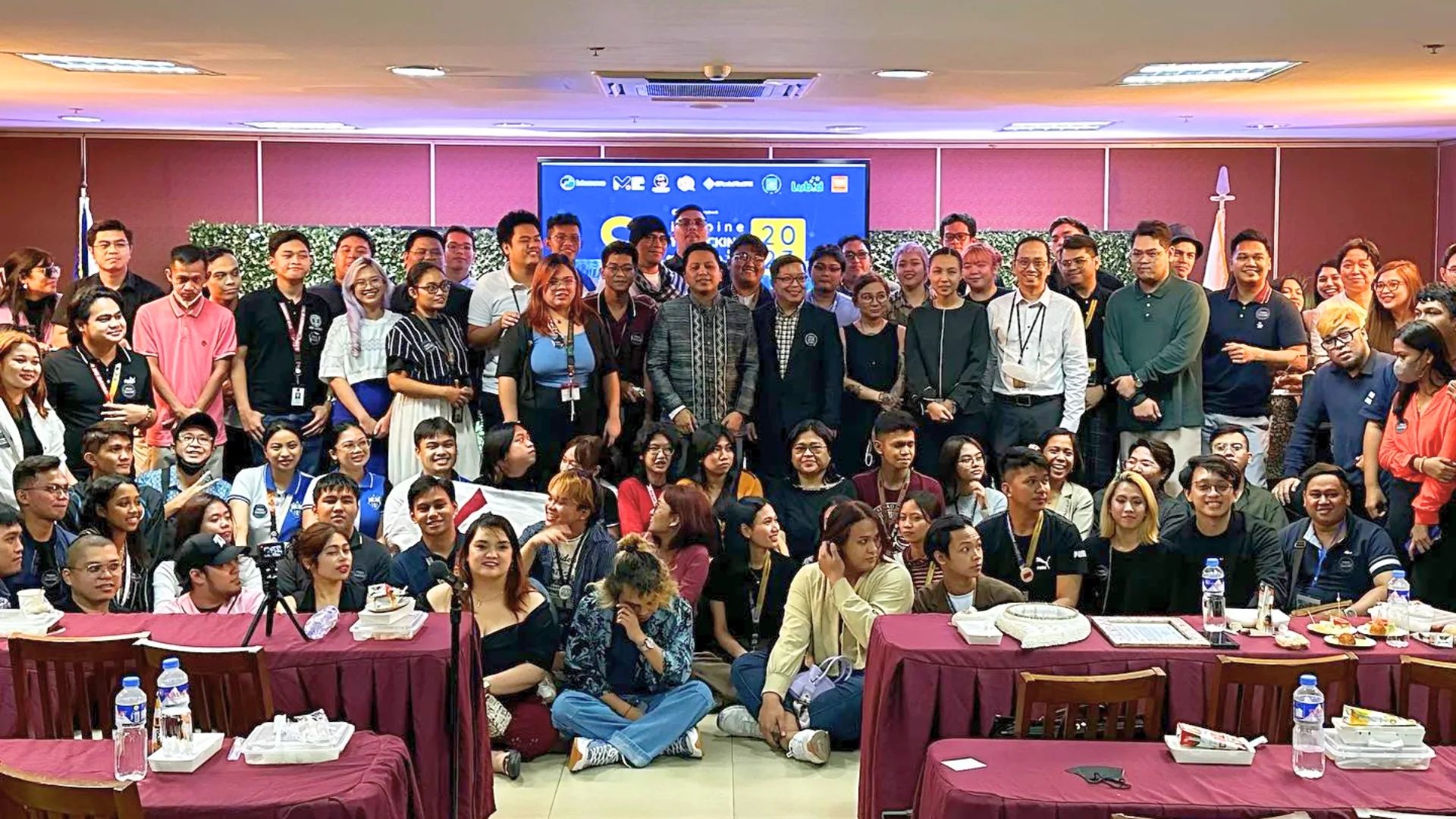In its pursuit to critically identify the role of influencers in combating disinformation and recognize their achievements in countering fake news, the Break the Fake Movement, together with Internews, organized the 2023 Fact-Checking Summit in the Philippines on June 30 at the University of Sto. Tomas, Manila. It was attended by content creators, public officials, tech platforms, academe, media and journalists, and civil society organizations.
Echoing the institution’s commitment to empowering individuals in distinguishing between truths and falsehoods and cultivating a community founded on positive participation and diverse perspectives for a resilient and informed society, UST Secretary General, Rev. Fr. Louie R. Coronel, O.P., E.H.L., in his opening remarks, as delivered by Dr. Emmanuel Batulan, Executive Assistant of the UST Office of the Secretary-General.
“Together, let us pave the way for a more informed, responsible, and inclusive society. Let us join hands and embrace the power of knowledge, critical thinking, and responsible digital citizenship as we embark on this transformative path together,” Dr. Batulan said.
In his opening message, the Founder and President of the Break the Fake Movement, Mr. Gabriel Billones Jr., shared the history of the organization, the reason why the Summit came to fruition, and the significance of leveraging each other’s strengths in combating this issue.
“The goal of the Break the Fake Movement is to create a united front against disinformation. This is an issue that we can never tackle alone, but this is a fight we can all share, and by fighting together, we can all make a great mile against this particular disorder,” he added.
Panel discussions, fireside chats, and a workshop on verification led by the Southeast Asia Teaching Fellow from Google News Lab, Ching Yee Choo, are part of the summit. Also, some completers of Media Civics Lab Fact-Checking Academy named Andrea Ortega Guanco, Kimmi del Prado, Manda Guiam, and Max Limpag shared their journey and learnings. The winners of the Pak! Check Video Making Contest was also announced.
The Summit coincides with the 3rd day of the Global Fact Summit held at the Convention & Exhibition (Coex) Center in Seoul, South Korea, an annual activity sponsored by the Poynter Institute.
Government’s efforts to promote media and information literacy
The Summit recognizes the role of policymakers in promoting media and information literacy at the national level. Sitting on the panel are Ms. Desideria Atienza, Executive Director III of the National Council for Children’s Television, and Hon. Shernan Gamol, Vice Mayor of Mansalay, Oriental Mindoro. The session was moderated by the Fact-Checking Academy’s Communications Manager, Mr. Paolo Miguel Ordonio.

As the panelists shared their programs and activities aligned with the summit’s mission, ED Atienza expressed her commendation to the Congress should the inclusion of MIL subjects in the basic education curriculum be pushed through.
“Because it might be too late if they would have the media literacy and acquire the skills if they are old already. But when you have it, even in kindergarten, Grade 1 [to 12], I think this would be a better Philippines when it comes to disinformation and misinformation,” she stated.
Combating fake news and disinformation needs a holistic approach, said Hon. Shernan Gamol, as he strives to deal with the challenges that come with advocating the truth.
“Major challenges that we need to face are the change in mindset of the people at the community level and change of behavior towards disinformation they saw online. There are barangays na walang internet connection. And for us who champion MIL, we provide basic training on how to use cell phones, computers, and social media. From there, we incorporate how to modify their behavior towards media and information na nakukuha nila sa schools and sa mga bahay nila,” he added.
Role of academe in the fight against disinformation
As a consultant to the country’s Department of Education, history professor and well-known historian Prof. Xiao Chua discussed in a fireside chat how the academe could solidify its position to combat disinformation. He said the curriculum is good but will not solve the whole problem.
“I hope they can be more open to consultancies of films, museums, etc. Because we are not just talking about political disinformation and political history but about all history. I just hope that people realize that this is the time we should get this opportunity to show that people are actually interested in history,” he stated.
Seeing how people are interested in history now more than ever, he also calls for everyone to make a stand and always be fair.
State of Fact-Checking in the Philippines
On the state of fact-checking in the country, Associate Professor Yvonne Chua of the University of the Philippines and the Project Leader of Tsek.ph, discussed and shared studies showing how disinformation has risen among Filipinos over time. Although the number of fact-checkers also increased to counter this, she reiterates that fact-checking is not enough, and she hopes to see fact-checking become an advocacy and a mindset.
“No fact-checker in their right mind would say that it is enough; we have never claimed it is never enough. We have always looked at ourselves as part of a whole-of-a-society approach to countering disinformation. It is a multi-stakeholder intervention, and for people to expect fact-checkers to lead the way is simply unfair and to disparage and denigrate their work,” she added.
Civil Societies: Beyond Fact-Checking: Multi-Stakeholder Approaches to Countering Disinformation
Since countering disinformation requires a multi-stakeholder approach, the Summit also invites different civil society organizations to discuss strategies that advocates should consider that go beyond fact-checking.
As an educator, Mr. Mark Lester Chico, President of the Philippine Association of Communication Educators (PACE), shared that their organization collaborates with various organizations, CSOs, NGOs, academic institutions, and the media in its pursuit to make students more media literate. PACE encourages its members to go outside their curriculum and develop activities or projects that will make students more involved in fact-checking.
Believing that the systematic and unregulated spread of disinformation on social media platforms is a serious threat to democracy, the rule of law, and human rights, the Movement Against Disinformation (MAD) responded to disinformation using a multi-pronged approach consisting of education campaigns, policy setting, and the filing of strategic litigations through its membership. Atty. Christianne Grace F. Salonga, the Executive Director of MAD, shared that since the pervasive spread of disinformation is currently not governed by any regulatory framework in the Philippines, tech companies that operate these platforms are actually distancing themselves from responsibility and accountability for the societal harms that their operations are causing here in the Philippines.
The Deputy Public Information Officer of the Computer Professionals Unit (CPU), Mr. Maded Batara III, also agreed to hold accountable those who are decreasing the spaces in the digital realm in the face of massive threats towards democracy through misinformation and disinformation. CPU also launched the Philippine Digital Justice Initiative, which aims to bring forward a digital rights agenda for the Filipino people that is people-centric. The advocacy is to hold those in power accountable and have a more united voice in countering massive disinformation through campaigns.
The Initiatives for Dialogue and Empowerment through Alternative Legal Services (IDEALS) Inc., on the other hand, focuses on treating information as a significant form of aid that is equivalent to any other humanitarian aid. Its Media and Communications Officer, Mr. Jag San Mateo, shared that their organization’s primary course of action in countering disinformation is community engagement and developing creative ways of communicating ideas.
Lastly, Mr. Frank Lloyd Tiongson, the Vice President of National Union of People’s Lawyers (NUPL)-NCR, shared that they are primarily involved in dealing with the fallout of disinformation, particularly red-tagging, which has led to the filing of charges and, at worst, the killings of those advocates who have been criminalized by associating these to terrorism.
What’s Next for Fact-Checking in the Philippines?
The Summit also became the platform for news and media organizations to share what they have done for fact-checking in the Philippines and acknowledge that there is still a lot more to be done to free this country from massive disinformation threats.

Encouraged by seeing how the fact-checking community increased over the course of time, Mr. Rommel Lopez, the Associate Editor of PressOne.ph, shared that advocates still need to mainstream it. He also emphasized that the issues of online attacks and resource sustainability should also be examined.
Fact-checker from MindaNews, Mr. Yas Ocampo, also discloses that countering disinformation is an uphill battle. Knowing that there was a time when journalists and the media were once the most reliable sources of information, the challenge now is how to identify the reliability of sources on emerging channels.
Rappler’s Head of Digital Strategy, Ms. Gemma Mendoza, told the audience that increasing challenges go hand in hand with the shrinking distribution space for verified information.
On the question of what worked and what did not work, Ms. Jennifer Aquino, Managing Director of Probe Productions Inc., shared their organization’s process in developing their content and became effective in communicating their goals to the rightful audience.
For Ms. Nica Rhiana Hanopol, a journalist from VERA Files, what worked for them were the collaborative networks that were built, using the 2022 elections as a good reference. What she thought didn’t work is that the Philippines is still yet to establish the real actors behind disinformation operations and make them accountable. There is a lack of research on the effectiveness of the new formats in communicating the mission of fact-checking.
Building Trust in Media Amid Eroding Digital Spaces
Together with the rise of digital citizens comes the increase of issues of credibility and reliability. The Summit also discussed how news and media organizations continue to stand by their positions and be trustworthy.
Ms. Audrey Domasian, Assistant Manager of the GMA Integrated News Social Media Team, saw building back the trust in media as a two-fold approach, using trust as their primary goal in communicating in digital realms. Since social media algorithms are based on engagements, the country’s leading media network keeps up with the challenges of visibility and algorithms by creating different types of content that will bring to the forefront these critical matters for people to become more informed.
The 2023 Philippine Fact-Checking Summit was a success, with over 276 participants attending (119 in person and 157 virtually). It emphasized the need to strengthen the country’s fact-checking ecosystem. This includes increasing the number of fact-checkers, providing them with more resources, and making their work more accessible to the public. The Summit participants also called for increased collaboration between fact-checkers and other stakeholders, such as government agencies, educational institutions, and civil society organizations.
The Summit ended with a call to action for all stakeholders to work together to combat disinformation and fake news. The participants recognized that the problem is complex and has no easy solution. However, they committed to working together to combat disinformation and fake news, laying the foundation for a more informed and resilient society.




Your point of view caught my eye and was very interesting. Thanks. I have a question for you.
Thanks for sharing. I read many of your blog posts, cool, your blog is very good.
I don’t think the title of your article matches the content lol. Just kidding, mainly because I had some doubts after reading the article.
Thanks for sharing. I read many of your blog posts, cool, your blog is very good.